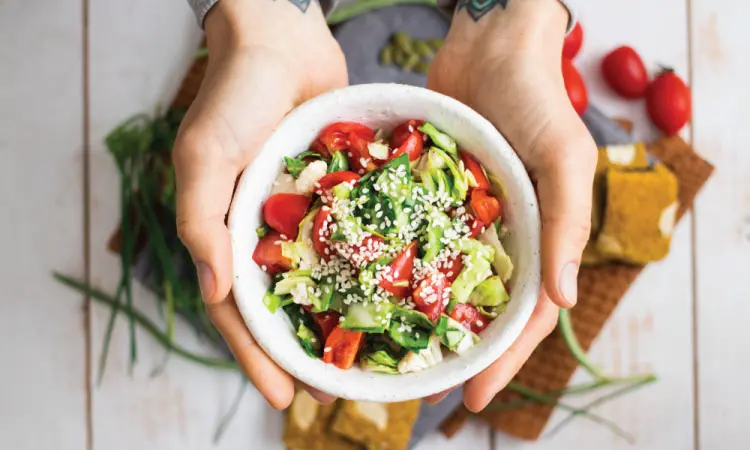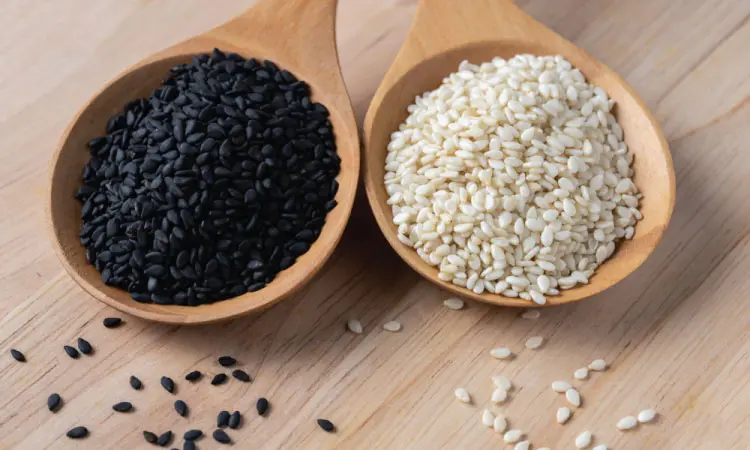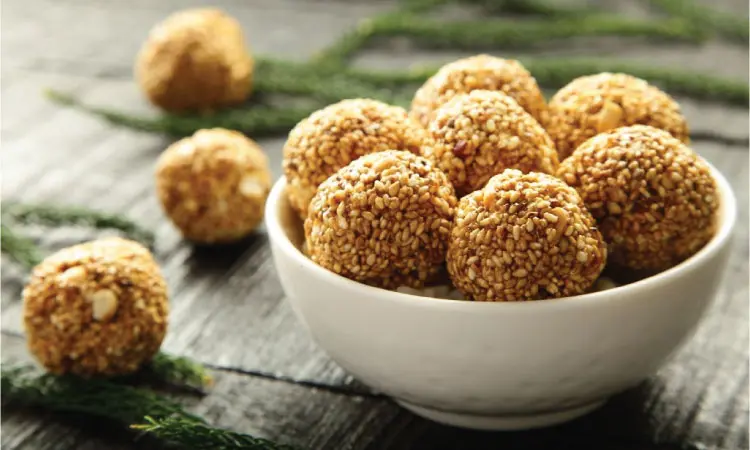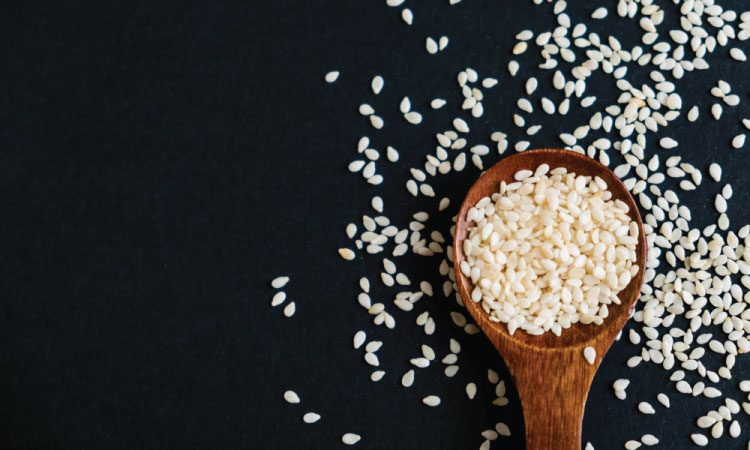Til or gingelly or sesame seeds are used commonly in many homes, but when pregnant, it becomes imperative to maintain a proper diet all during pregnancy. There are a lot of foods that might not be safe, and a lot of foods that are good for you. It can be confusing to keep a track of all of this. While moderation is the rule of thumb when pregnant, at some point you might be wondering if it is safe and healthy to eat sesame seeds during pregnancy.
You are not alone. This article sheds some light on the nutritional profile of sesame seeds and whether or not they are healthy for pregnant women.
Is It Safe To Eat Sesame Seeds During Pregnancy?
Till seeds or sesame seeds are considered as a ‘heat emitting food’. They belong to the Pedaliaceae family, and are hot in nature. Basically known to cause heat in your body, heat generating foods are generally considered unsafe during pregnancy. Believed to a heat-generating food by many people across India, sesame seeds are counted as one of the foods to avoid during pregnancy.
Infact, dry sesame seeds were used as a medicine for inducing abortion. Sesame seeds consumed in excess do have a uterus stimulating property which can trigger abortion during pregnancy. But for this, one has to consume a high amount of sesame seeds as in concentrated medicinal form. So if you have had a few, do not fret.
However, many expecting mothers across the world do consume sesame seeds and related products. No side effects are scientifically proven so far. On the other hand, these small seeds carry many nutrients that are beneficial for the healthy development of the fetus and the healthy progression of the pregnancy.
Related Reading: 12 Early Pregnancy Tips To Avoid Miscarriage
Even so, there are many factors to take into consideration before including sesame seeds in your regular diet during pregnancy. Also, just like all other foods, to reap all its nutritional benefits, it is important not to cross the moderation benchmark when it comes to consuming sesame seeds during pregnancy.
Furthermore, it is wise not to eat sesame seeds during early pregnancy. The first trimester of the pregnancy is the most vulnerable stage of pregnancy and it is sensible not to have anything new or anything that has possible side effects during this time of pregnancy.
Calculate Due Date With LMP
Sesame Seeds Nutrition Facts
Sesame seeds are packed with various essential nutrients that are highly beneficial during pregnancy. Consuming a few seeds will help to reap these benefits. Til seeds are an excellent source of iron and calcium – two minerals that are vital during pregnancy.
Sesame seeds contain vital minerals like selenium. It also contains magnesium, potassium, and B Vitamins in trace amounts. Sesame seeds also contain a considerable amount of antioxidants, vitamin C, vitamin E and fibers.
Moderate and watchful consumption of sesame seeds during pregnancy can help you derive the most benefits
Now let’s see how and why sesame seeds are advantageous during pregnancy.
How Do Sesame Seeds Help In Pregnancy?

Sesame seeds are packed with lots of vital nutrients and hence considered as a superfood. Sesame seeds are counted as a great vegetarian source of protein and monosaturated fats (healthy fat).
Most of these nutrients are important for the healthy progression of pregnancy. If consumed in a limited quantity, pregnant women can reap many of the health benefits provided by sesame seeds. Sesame seeds are energy boosters and therefore help to lower mental stress and weakness that are quite common among pregnant women.
Some of the benefits of eating sesame seeds during pregnancy are:
1. Sesame seeds during pregnancy help to enhance bone health
Sesame seeds contain zinc that boosts bone mineral density and bone health. Sesame seeds are a great source of calcium, a mineral that is vital for bone health.
Pregnancy is a time women should more concentrate on their calcium intake. That’s why pregnant women are recommended to have milk during pregnancy. It is not only important for the bone development of the fetus but also to maintain the bone density of the mother and thereby preventing possible bone issues like osteoporosis in the future.
2. Helps with blood production
During pregnancy, the blood volume increases by 50%. Sesame seeds contain three key elements that help with hemoglobin production– Iron, copper, and vitamin B6. Therefore, eating sesame seeds during pregnancy helps with blood production and helps to reduce the risk of anemia.
3. Helps with the growth and development of the fetus
Proteins are the building blocks of life. Amino acids are the building blocks of protein. Every human cell contains protein. Now you can imagine its role in the developing fetus. Sesame seeds are a commendable source of protein and amino acids that are essential for the proper growth of the fetus.
Related Reading: Top 10 Protein-Rich Foods For Pregnancy
Also, sesame seeds are rich in B Vitamins (like riboflavin, niacin, thiamin, and pyridoxine). B vitamins play an important role in the development of the fetus. Being a rich source of iron, sesame seeds during pregnancy ensure the fetus receives a sufficient supply of oxygen.
4. Sesame seeds during pregnancy help to combat constipation
Sesame seeds are rich in fiber content. Therefore, eating sesame seeds during pregnancy helps with digestion. They also help to regulate bowel movement and thereby prevent or alleviate constipation. Constipation is a common problem faced by a majority of expecting mothers.
5. Boosts Immunity
Sesame seeds contain a significant amount of vitamin C. One of the main properties of vitamin C is boosting the immune system. Pregnancy is a delicate time and immunity of pregnant women is generally compromised.
That is why expecting mothers are prone to various infections and illnesses. It is imperative for pregnant women to boost their immunity and stay safe from infections and diseases as far as possible. By including sesame seeds in your pregnancy diet you can boost your immunity and keep common infections like cold and flu at bay.
6. Improve oral health
Eating sesame seeds during pregnancy can enhance oral health. Pregnancy is the time many women face dental issues like cavities. This is mainly because of inadequate calcium intake.
Calcium is an important nutrient to keep up oral health during pregnancy. Sesame seeds are an excellent source of calcium. By including sesame seeds in your diet, you can improve your oral health along with bone strength during pregnancy.
7. Reduce the risk of neural tube defects
Folic acid is one of the vital elements during pregnancy. That is why it is included in prenatal vitamins by the doctors. Folic acid is important to prevent neural tube defects in babies. Sesame seeds contain folic acid.
8. Sesame seeds are good for heart

Including more polyunsaturated and monounsaturated fat rather than saturated fat is important to bring down the bad cholesterol and enhance heart health. According to a source, the saturated fat level in sesame seeds is very low (5%) concerning polyunsaturated fat (41%), and monounsaturated fat (39%).
Oleic acid in sesame seeds brings down the bad cholesterol or LDL levels and improves your good cholesterol or HDL levels. Therefore, regular consumption of sesame seeds may help decrease high cholesterol and triglycerides.
9. Enhance the function of the thyroid gland
Selenium in its maximum concentration is found in the thyroid gland of the human body. Therefore, evidently, this element plays a critical role in creating thyroid hormones. It is important to maintain the thyroid hormone level throughout pregnancy. Both under and over secretion of thyroid hormone triggers many complications during pregnancy.
Related Reading: When To Start Eating Methi Ladoos During Pregnancy (Fenugreek During Pregnancy)
Moreover, elements like zinc, iron, copper, and vitamin B6 present in sesame seeds support the creation of thyroid hormones and enhance thyroid health.
10. Sesame seeds can help with gestational diabetes
Sesame seeds while high in protein and healthy fats and at the same time are low in carbs. This formula is excellent for maintaining a healthy blood sugar level. Sesame seeds can slow down how fast the sugar is absorbed from food. This might help expecting women with gestational diabetes.
11. Help to deal with hypertension
High blood pressure is one of the major risk factors of pregnancy. This could potentially contribute to many serious pregnancy complications. Sesame seeds are high in magnesium. Magnesium plays a very important role in bringing down the blood pressure.
Also, sesame seeds are rich in vitamin E and antioxidants. These elements help to improve blood circulation, thereby maintain normal blood pressure.
12. Help to regulate metabolism
Maternal metabolism mounts noticeably and doubles towards the end of pregnancy. This is because the energy requirement of the mother increases as the pregnancy progresses. Metabolic rates are found to increase significantly by 15 weeks gestation and they peak during the third trimester
Sesame seeds are a good source of B vitamins. B vitamins facilitate metabolism. Also, some trace minerals like iron, copper, and manganese in sesame help to regulate the metabolism
Related Reading: 15 Fruits Not To Eat During Pregnancy
What Are The Side Effects Of Sesame Seeds During Pregnancy?
Eating sesame seeds in limited quantities during pregnancy is not unsafe. However, one can’t overlook the chance of allergic reaction. Yes, consuming sesame may trigger an allergic reaction in some women.
Allergic reactions can range from mild sensitivity to severe, life-threatening condition-anaphylaxis. Therefore, during pregnancy never attempt to eat sesame seeds to grab their benefits if you have a history of allergies to seeds.
Pregnancy is not the time to experiment.
Eating Black Sesame Seeds or White Sesame Seeds – Which Is a Healthier Choice?
The basic difference between black and white sesame seeds is black seeds retain their hull, while the hull is removed in white sesame seeds. The composition of both black and white sesame is more or less the same. But the taste and smell vary a bit. Also, when you consider the B vitamins and calcium, we would say black sesame seed is a better choice during pregnancy.
According to a study, the antioxidant activity of black sesame is more when compared to white sesame seeds. However, there is no harm in consuming white sesame seeds. White sesame seeds taste milder than black ones and are used in many recipes.
How Many Sesame Seeds Can One Eat When Pregnant?

It is usually said that having up to 3 tablespoons of sesame seeds is safe. However, during pregnancy, it is wise to limit your consumption a little more.
Sesame seeds cause no harm when taken in amounts commonly found in food. You can sprinkle it on food lightly to enhance the taste.
So you can have a reasonable portion of sesame chicken while pregnant. But try not to eat dishes or limit the intake of food made solely from sesame seeds (like til ladoo) more often during pregnancy.
If you do end up having to eat something like that, make sure it is only once in a while. Remember there are other substitutes you can use that have the same benefits and uses as sesame seeds.
Conclusion
Hope this article helps to alleviate your doubt about “are sesame seeds during pregnancy safe or not”. So never hesitate to sprinkle some dry sesame seeds over your curry or salads. All you have to keep in mind is never cross the moderation level.


